CAREER BLOGS Microbiology 2024-2025

researcher Aisling Brady What was your first full time job following graduation? After graduating from university, I went straight into a PhD programme and skipped doing a masters. My first paid role in science was an 8 week internship between third and fourth year of my undergraduate degree. What other roles have you had since your graduated? Since graduating I have played a role in a number of public engagement programmes and outreach work with the postdoctoral association at the University of Liverpool. What have been the top 3 highlights in your job in the last 6 months? Travelling. Going through to Edinburgh to Microbiology Society meetings every year and this year presented a poster. Organized a seminar for the postdoctoral association at the University of Liverpool to promote the connections between the different campus. Mentoring younger students with similar interests and aspirations. What are the top 3 skills/qualities needed for you role and why you need them and how have you developed them? encourages you to question why you are doing something rather than simply following instructions. It helps in making informed decisions and finding better solutions. 2. Perseverance is equally important, as challenges and obstacles are inevitable. When things aren’t working, the ability to troubleshoot, adapt, and persist can make all the difference in overcoming difficulties. 3. Strong communication skills are crucial, as the ability to reach out to others for guidance, collaboration, or support can lead to valuable insights and problem-solving opportunities. If you could go back in time and have a chat with your 3rd undergraduate self, what would you say? Seek out strong mentors to guide you—they'll help keep you on track. PhD applications can be time-consuming, so don’t feel pressured to apply to every opportunity. Your final exams should take precedence over internships or other extracurriculars. In the end, everything will work out. Is there anything you wish you knew when you started looking for jobs? Don’t stress. I’d like to tell myself I don’t need to have a clear cut plan or have it all figured out. When I left I had applied to both the NHS and the PhD and did not know the direction I would choose. 1. Critical thinking is essential because it Professional profile Undergraduate degree Further learning Current job and company BSc (Hons) Microbiology (2018) PhD Molecular Bacteriology and Infection Postdoctoral Researcher University of Liverpool
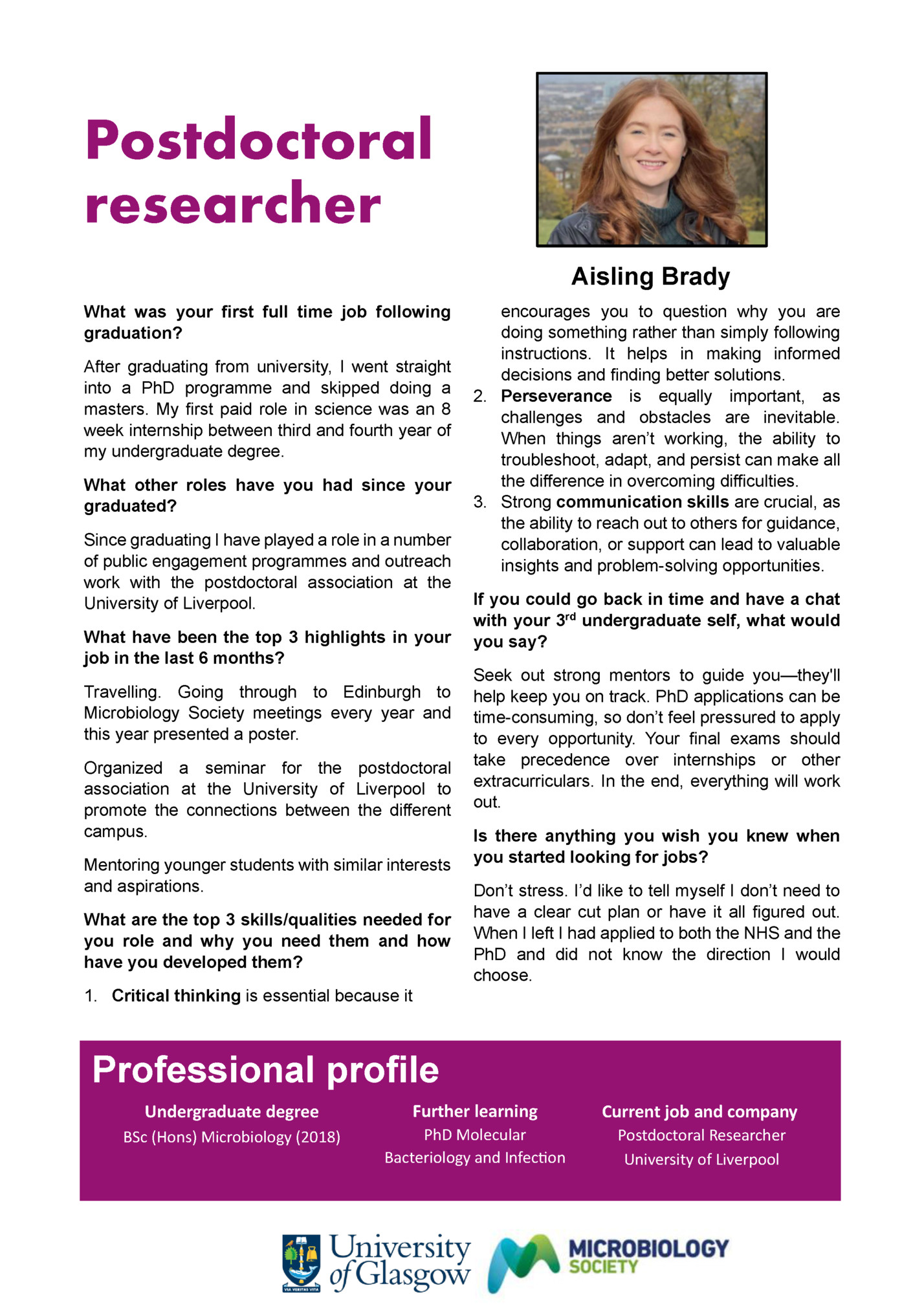
Operator Amy Carroll What other roles have you had since your graduation? First, I worked as a Research and Development Scientist at Omega Diagnostics. After that, I took a gap year and completed a master’s degree before moving into a role as a Technical Operator at Celtic Renewables. to be conducted within strict time frames. I developed this skill through hands-on experience in the lab, ensuring tasks were completed efficiently and accurately. What other roles have you had? 2. Presentation skills – Being able to clearly communicate findings is essential in my role. I developed this skill through my work, as I frequently had to present my research and results to colleagues. Quality control analysis at a range of biotechnology companies, for example one company that madae blood typing kits. Recently had two roles within the NHS, the most recent of which being a clinical trial coordinator at the beatson cancer centre. 3. Data manipulation – Interpreting complex data and making it more understandable is a key part of my job. I honed this skill by working closely with my findings, learning how to analyse and present data in a way that is both accessible and meaningful. What have been the top three highlights of your job in the last six months? What would you tell your 3rd year self? 1. Taking part in team-building days, which helped strengthen relationships with colleagues. 2. Receiving a bonus, which was a great recognition of my hard work. 3. Passing my driving test, making it much easier to travel to work. What are three key skills or qualities needed for your role? 1. Time management – This is crucial when working with live bacteria, as experiments need Don’t stress, don’t pull all-nighters, and maybe cut back on the coffee! And don’t worry—yes, you might get a job you don’t love at first, but it’s all part of the journey. Anything you wish you knew when first looking for jobs? I wish I had known more about what to expect in an interview and had more practice with interview techniques. It would have helped me feel more prepared, calm and confident during the whole process. Professional profile Undergraduate degree Further learning Current job and company BSc (Hons) Microbiology (2019) MSc Industrial Biotechnology Technical operator Celtic Renewables
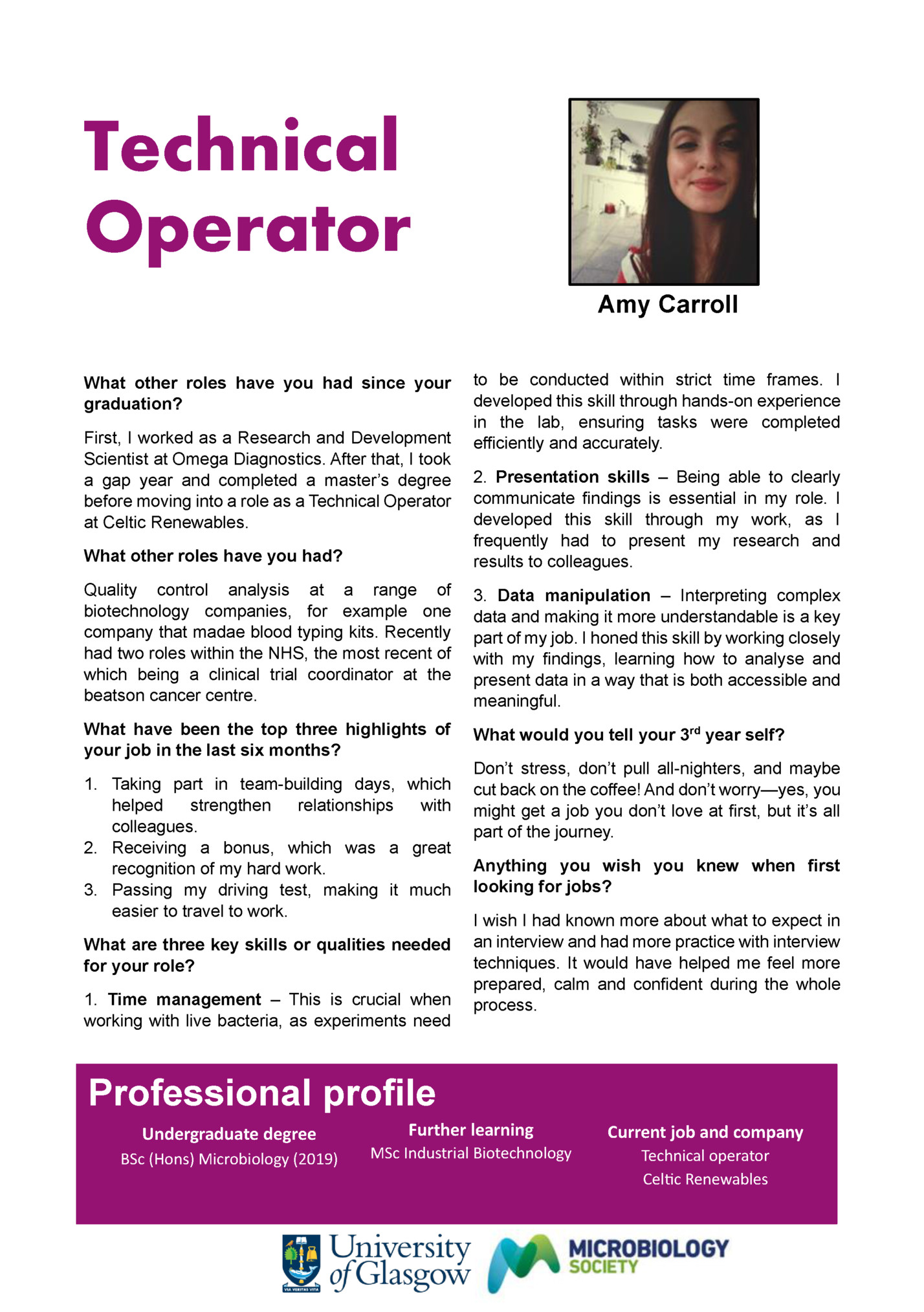
Senior Private Secretary Angus Robson What was your first full-time job following graduation? You don’t have to go into academic research, there is plenty of other opportunities. My first placement was at HMRC where I worked in kind of operations support. random placement but it was really enjoyable I got to do some largescale projects” also do some line management for around 100 people and ran a call centre for about four months. Anything you wish you knew when first looking for jobs? What other roles have you had? I moved on to my second placement I did a year as a private secretary. it's basically like a mini chief of staff for a minister a government minister. what you do is you cover part of their portfolio stuff (I didn't lead it all) but I was kind of his little point of contact on that. What have been the top three highlights of your job in the last six months? Biggest ones the election, so as a civil servant you are the point of contact for the minister during the election… you're the first experience the new minister has. you are their first chat about energy and the department and how it works and you effectively have to like teach administer in how to be a minister. Another highlight went Iceland to see it as a greenhouse gas capture technology made by a company called climeworks. What would you tell your 3rd year self? It is okay if you don’t know what you want to do after university at the moment, it is a good idea to have a look and see what is out there. Theres a huge the value of connecting with peers in higher years or experienced roles for insights into opportunities and career paths. Explore different interests, take risks (e.g., trying new roles during your third year summer), and gain as much practical experience and a good way to do this is through, society involvement, or part-time work. These can all significantly benefit you when entering the job market. If you were hiring what skills would you look for? Theres an importance of showcasing individuality and unique experiences on your CV. Employers value candidates who demonstrate passion, creativity, and initiative through hobbies, extracurriculars, or distinctive experiences. Do you have any advise for us? Be smart and prepared, don’t leave everything to the last minute. Take every opportunity presented to you and make the most of it, don’t be scared! It is important to speak to who you know, you never know who can help you. Professional profile Undergraduate degree Further learning Current job and company BSc (Hons) Microbiology (2021) N/A Senior Private Secretary Department for Energy Security and Net Zero
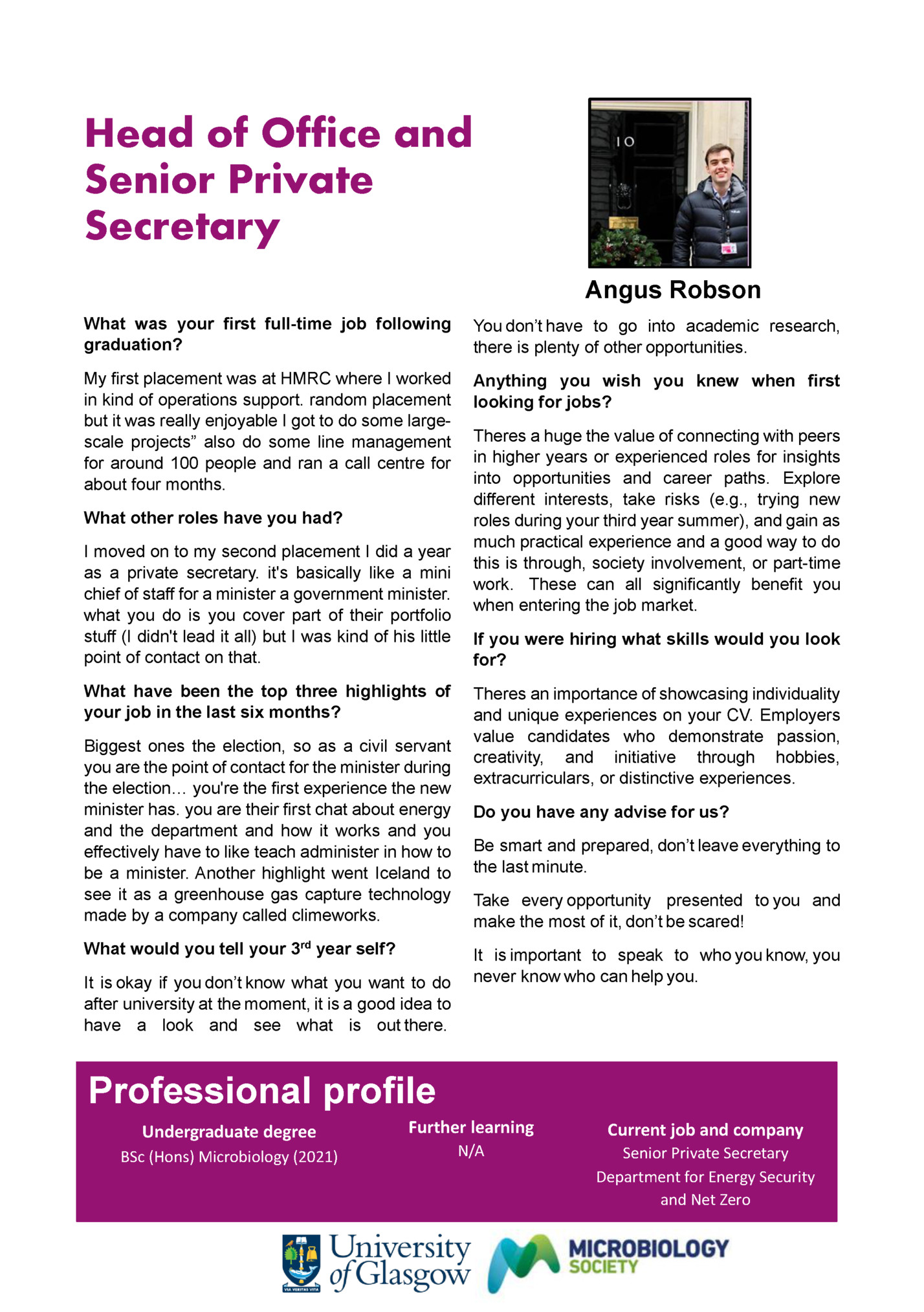
Analyst Scientist Caitlin Rutherford What was your first full-time job following graduation? OracleBio was my first job out of university. I started working there as an Image Analyst Scientist and have recently been promoted. I first discovered my interest in data analysis during Covid-19 when remote labs were introduced, which gave me the opportunity to work more with data. What skills are needed to perform your role? 1. Good communication and community building are essential for creating an efficient work environment. For example, the corporate and laboratory offices operate as separate departments, so maintaining a clear and constant flow of information is crucial. 2. Attention to detail - A large part of my work involves analyzing biopsies, which can be repetitive and requires a keen eye for accuracy. 3. Working with artificial intelligence (AI) also demands strong problem-solving skills and flexibility. The programs we use can be finicky, so patience is important when troubleshooting finding workarounds. and Anything you wish you knew when first looking for jobs? Your job doesn’t need to match your degree. I studied microbiology, but many of my coworkers came from different backgrounds. Be open to learning on the job and expect a steep curve. Remember, interviews are a two-way street—you’re evaluating the company too. While education matters, it’s not always a dealbreaker. To find companies that align with your interests, check the attendee lists of industry conferences—they’re a great way to identify key players and potential employers. What would you tell your 3rd year self? I would tell myself to stop stressing. I’ve always been a naturally stressful person, and I never really enjoyed the academic process. I was always more eager to start working than to continue pursuing academia. Professional profile Undergraduate degree Further learning Current job and company BSc (Hons) Microbiology (2021) N/A Senior Image Analyst Scientist OracleBio
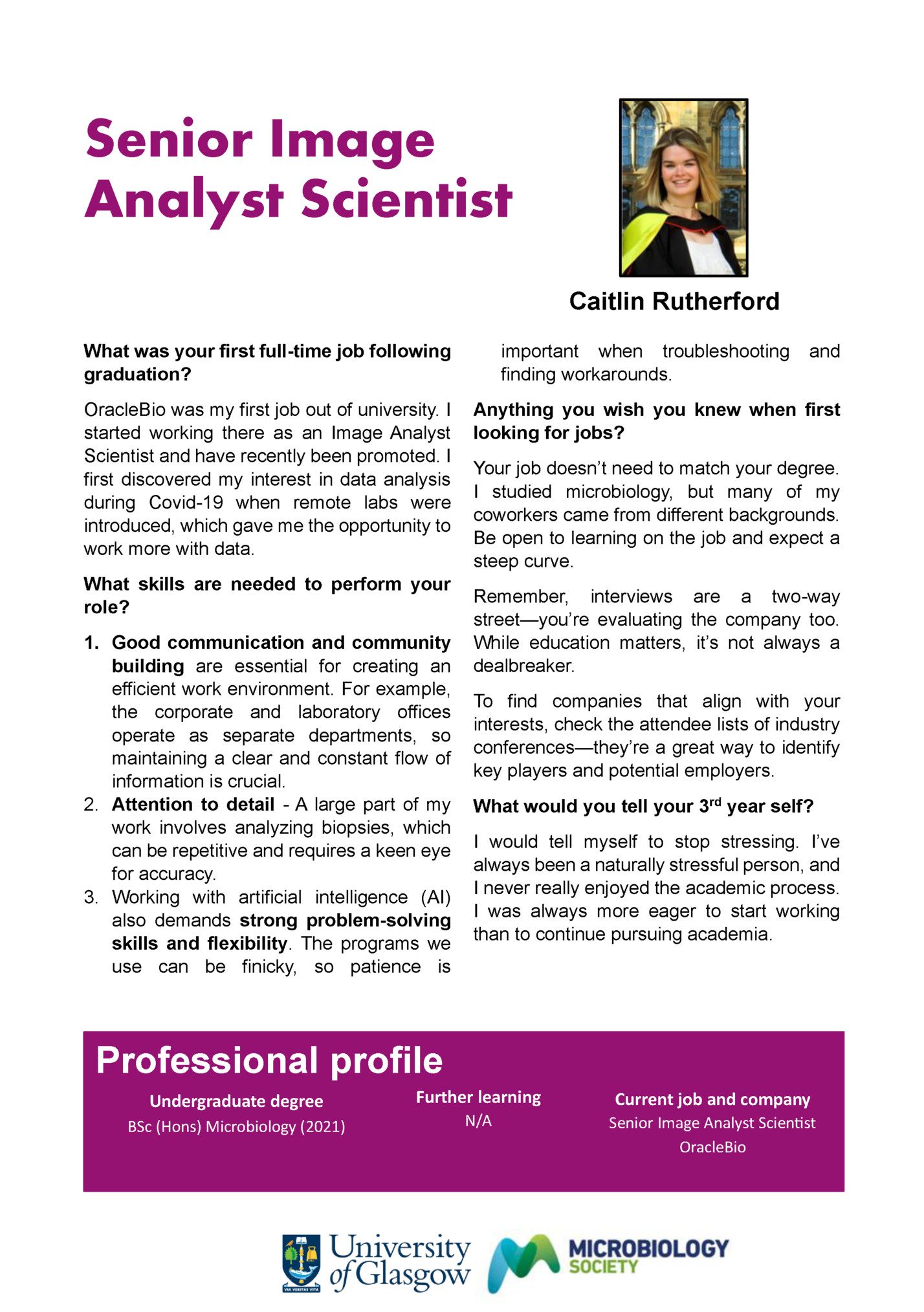
Account Manager Chloé Cassaro What was your first full-time job following graduation? I completed an MSc in Microbiology at the University of Glasgow before pursuing a bioscience doctorate at Oxford. Although I had no previous job experience, I secured a position at Oxford Nanopore Technologies six months before finishing my doctorate. What have been the top 3 highlights in your job in the last 6 months? My highlights include being able to speak my native language, French, in the workplace, transferring the scientific skills I acquired across different fields, and successfully diverging from academia. What are the top 3 skills/qualities needed for your role, why you need them, and how have you developed them? I believe the key qualities required for my job include being organized, working well in a team, and feeling comfortable presenting scientific concepts. I developed most of these skills through my education; however, my ability to confidently present scientific topics significantly improved during my PhD, as it involved numerous presentations. What would you tell your 3rd year self? more social events. Additionally, I wish I had known that academia wasn’t the only option— there are many other career paths available with a science degree. One of the most important things I’ve realized is that I used to think not finishing my degree or not getting top grades would be the end of everything—but that’s obviously not the case. Tell us more Technologies. about Oxford Nanopore Oxford Nanopore Technologies was established in 2005 and focuses on developing a new generation of DNA/RNA sequencing technology. The company has over 1,000 employees and operates in multiple countries, including the US, Singapore, China, Japan, Germany, France, and India. What does your role entail? In my role, I call existing customers to understand the type of research or work they are conducting and assess whether they would benefit from any additional devices. I primarily cover the south of France and collaborate closely with colleagues based there. Once a month, I travel to France to meet with clients and attend monthly company meetings. Additionally, I organize webinars and attend conferences to stay engaged with the scientific community and industry trends. Looking back, I was quite stressed and wish I had enjoyed the process more, such as taking part in Professional profile Undergraduate degree Further learning Current job and company BSc (Hons) Microbiology (2014) PhD Bioscience Inside Sales Account Manager Oxford Nanopore Technology
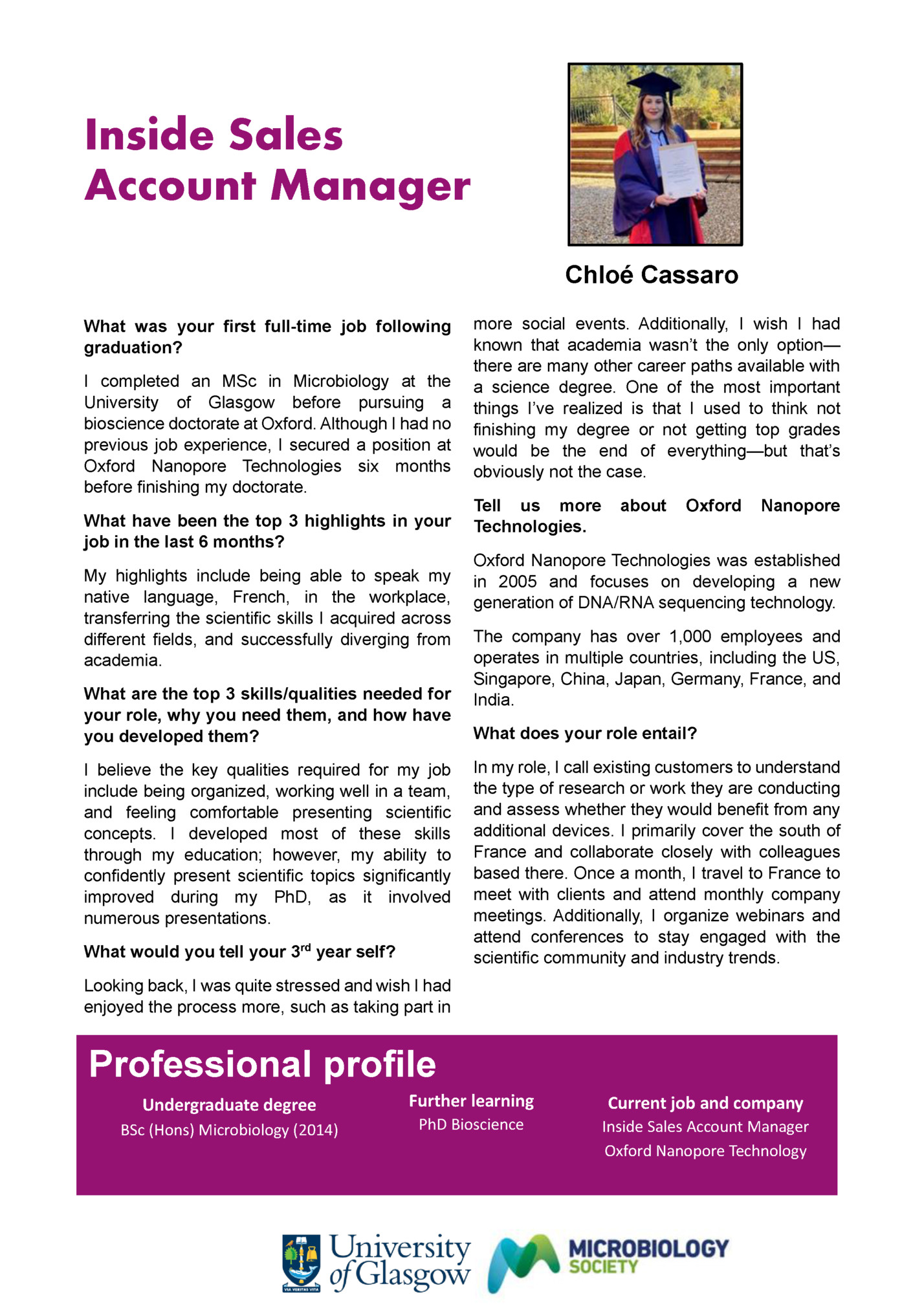
Translation Consultant Clara Blue Can you tell us about your current role at eXmoor Pharma? As a Senior CMC Translation Consultant at eXmoor Pharma, I handle overseeing the development and manufacture of gene therapy and biologics products. My role involves defining CMC (Chemistry, Manufacturing, and Controls), regulatory, and analytical strategies to ensure the successful transition of products from pre-clinical stages to commercial production. What inspired you to pursue a career in gene therapy and biologics? My passion for science and the potential of gene therapy to revolutionise medicine inspired me to pursue this field. The ability to develop treatments that can address the root cause of genetic disorders and improve patients’ lives is incredibly motivating. What are some of the key challenges you face in your role? One of the main challenges is ensuring that the products meet stringent regulatory requirements while maintaining high standards of quality and safety. Additionally, the rapidly evolving nature of the field requires continuous learning and adaptation to new technologies and methodologies. How do you stay updated with the latest advancements in gene therapy and biologics? I stay updated by attending industry conferences, participating in professional networks, and reading scientific journals. Continuous education and collaboration with peers are essential to staying at the forefront of this dynamic field. Can you share a significant achievement in your career? A significant achievement in my career was successfully leading the CMC strategy for a gene therapy product that received regulatory approval. This involved coordinating crossfunctional teams and navigating complex regulatory landscapes to bring the product to market. What advice would you give to someone aspiring to enter the field of gene therapy and biologics? Answers: My advice would be to gain a strong foundation in the sciences and seek opportunities for hands-on experience in research and development. Networking with professionals in the field and staying curious about new advancements will also help you build a successful career. Professional profile Undergraduate degree Further learning Current job and company BSc (Hons) Microbiology (1999) PhD Molecular and Medical Microbiology University of Glasgow Senior CMC Translation Consultant eXmoor Pharma
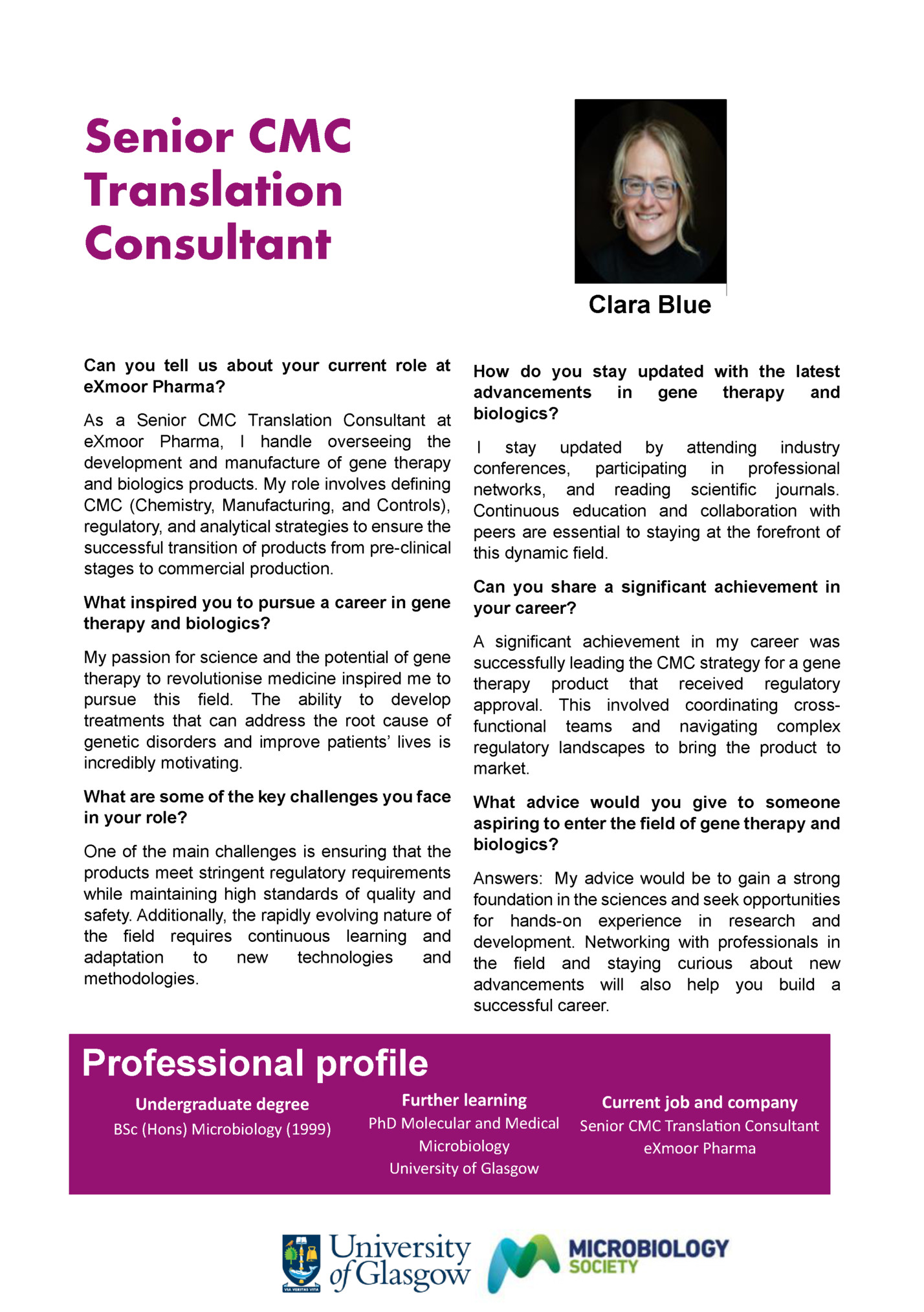
Information Scientist Daniel Sanchez What are the top skills needed for you role? What was your first full-time job after graduation? After graduating in 2021, I worked at University of Edinburgh where I was tasked with finding papers that first reported zika virus. What other roles have you had since you graduated? I worked in a PCR lab in UK Lighthouse Labs Network, Glasgow for a short while. It was a collaboration between the University of Glasgow and the NHS at Queen Elizabeth Hospital. After this, I moved to London to complete by Masters degree in Epidemiology at London School of Hygiene & Tropical Medicine. Following my graduation, I started at my current job with UKHSA as an Epidemiologist and Information Scientist. What have been the top 3 highlights in your job in the last 6 months? I presented at a conference 3 months after starting at UKHSA. It is good to see the work I do make a massive impact that ends up changing people’s lives. There is lots of room in my job to further my knowledge by partcipating in academic activities like learning new coding language and software, publish academically and even visit hospitals to talk with nurses and doctors. Presenting is a really big part of my job so it is important to be comfortable enough to do this well. Producing this content is also important as I have to be comfortable enough to talk to doctors and scientists when presenting summaries or coordinating responses to outbreaks. Interpersonal skills are extremely useful because it is important to make things simpler as you have to explain things simpler as you have to explain things to people ranging from data scientists to nurses. If you could go back in time and have a chat with your 3rd year undergrad self, what would you say? Don’t be obsessed with getting the target job if you have something in mind. For example: field epidemiology and disaster zones will take a significant amount of experience so it is best to get a job that will position you well for future opportunities. Cold-email everyone! Someone will inevitably reply. It’s not easy to graduate, it takes some people a while to adjust to post-uni life. Is there anything you wish you knew when you started looking for jobs? Public health government organisations care a lot about equity and teamwork so it is important to know this when applying. AI streamlines job applications by saving each one for future use. Professional profile Undergraduate degree Further learning Current job and company BSc (Hons) Microbiology (2021) MSc Epidemiology Epidemiologist & Information Scientist UKHSA
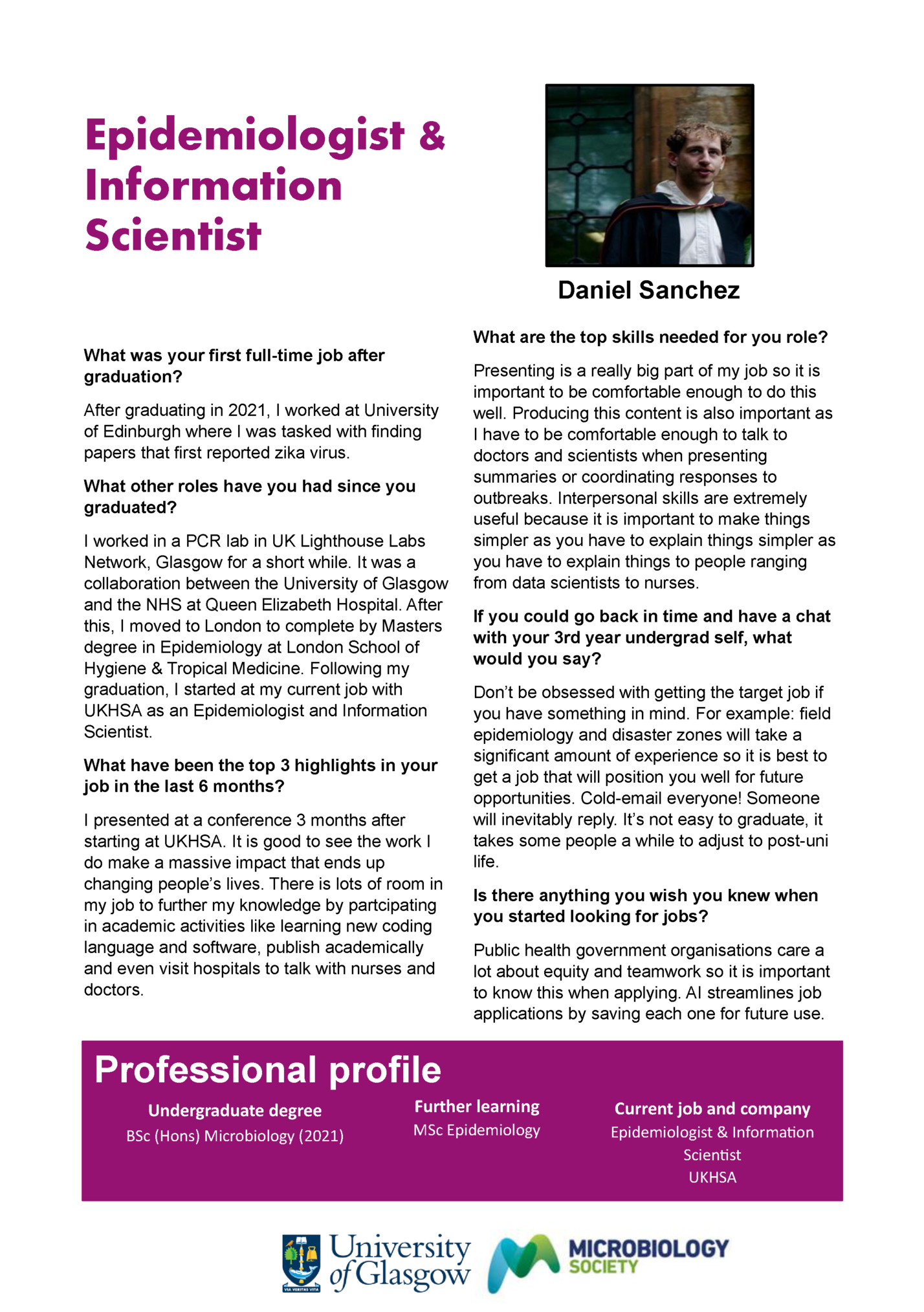
Dzachary Zainudden What’s your current job like? My current Job primarily focus on the phylogenetic studies of human seasonal viruses. Since I possess experiences covering wet and dry lab techniques, I synthesise and present wet lab research to the dry lab research team in order for them to effectively interpret and utilise the data. I had learnt Bash scripts, ggplot2, Linux from its basics in order for me to effectively visualise and communicate data. Club and writing for the Glasgow Insight into science and technology (GIST) student science magazine, helped me expand my connections. Since GIST is a collaboration between Glasgow and Strathclyde universities, it provided opportunities to engage with students from both institutions. These experiences allowed me to approach networking in a way that felt natural and meaningful. What’s have you learnt in your current role? Prospects of Bioinformatics in Singapore vs UK? Through my role the past 2 months, I have learnt: 1. Avoid Comparisons. Focusing on my own contributions kept me productive and confident in my role. 2. Mentorship is Everywhere. Connecting with PIs from different departments deepened my understanding of bioinformatics and virus research. 3. Embrace Networking. Building connections beyond my immediate circle broadened my knowledge and engagement in research discussions. How did you approach networking while you were a student ? As an introvert, networking was initially challenging. I started small by connecting with peers who shared my interests. Getting involved in extracurricular activities, such as the Kendo In today’s research, data is critical to its outcomes. Therefore Data science is a hot market in Singapore and with the advent of the pandemic, virology is in high demand as well. Therefore possessing both skills would enable you to be a formidable force today in any country. Hence, don’t limit yourself to Singapore and the UK as the skills reflecting both fields are in high demand across the globe! Any advice to your 3rd year undergraduate self ? Pursue something that you are truly passionate about not just because you would want it highlighted on your CV. Also don’t push yourself until you break! Not taking on more responsibilities than you can and ensuring that you are content with what you have achieved shall be enough. Professional profile Undergraduate degree Further learning Current job and company BSc (Hons) Microbiology (2020) N/A Bioinformatician Duke NUS Medical School
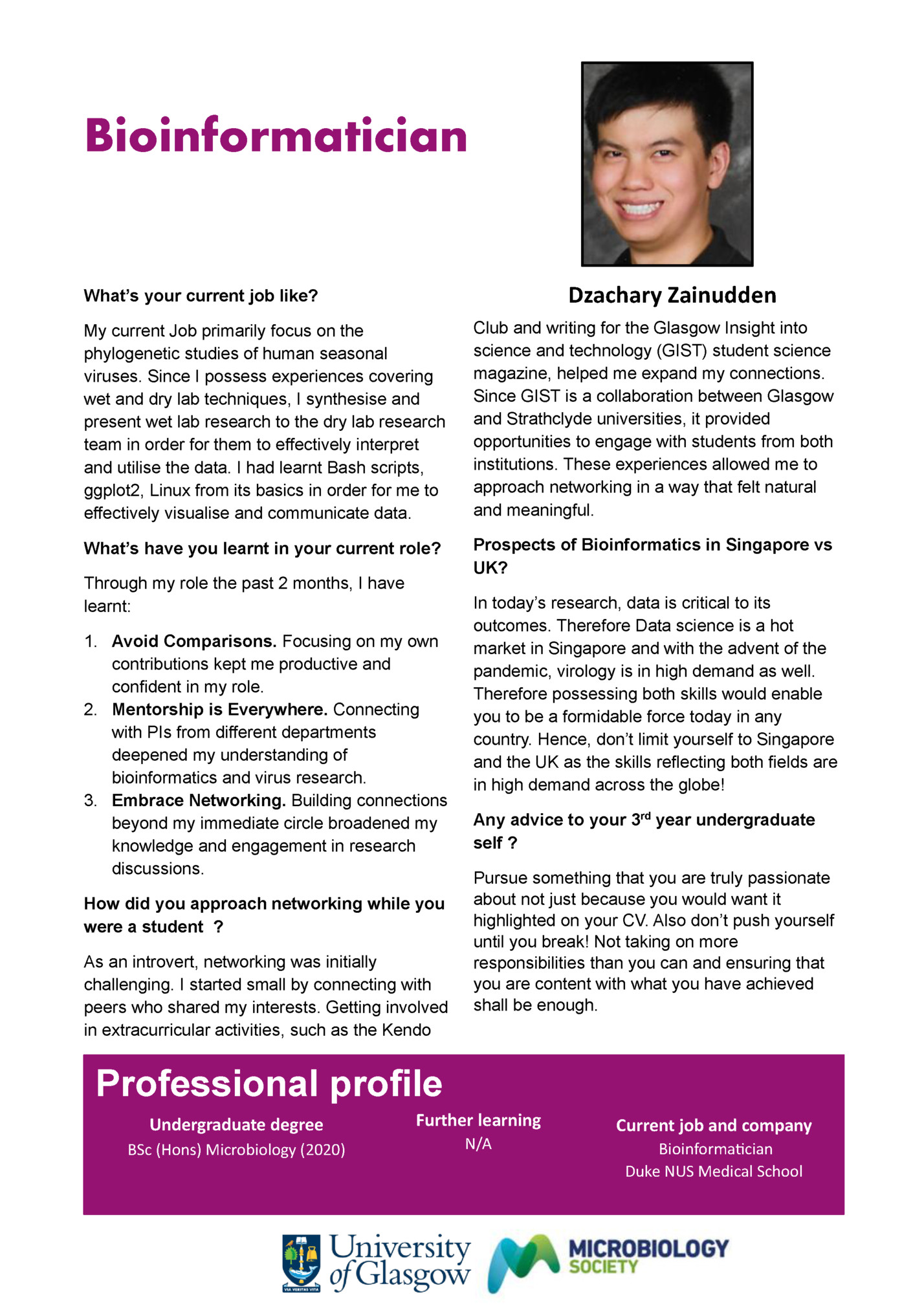
Fleepit Digital © 2021